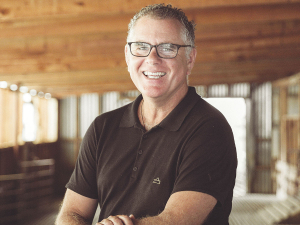Top wool advocate bales out
The conversion of productive farmland into trees has pretty much annihilated the wool industry.
 Craig Smith of National Council of New Zealand Wool Interests says the new national standard is a great opportunity for the wool industry.
Craig Smith of National Council of New Zealand Wool Interests says the new national standard is a great opportunity for the wool industry.
A new NZ National Standard for Wool has been established, under the New Zealand Farm Assurance Programme (NZFAP).
Fifteen new wool companies have signed up to the NZFAP, which provides assurance to customers and consumers about the integrity, traceability, biosecurity, food safety, environmental sustainability and animal health and welfare of New Zealand's primary sector products.
The 15 wool companies join 17 red meat processors, one other wool company, a sheep milk company, Beef + Lamb NZ (B+LNZ) and Deer Industry NZ (DINZ) who are already in the programme.
It will enable the new wool industry members to adopt the NZFAP as a NZ National Standard for wool. There are currently around 8,000 NZFAP-certified sheep, beef, and deer farmers, with about 6,500 farming sheep. Membership of the NZFAP means that all wool companies that sign up will immediately have access to Farm Assured wool from these 6,500 properties. For farmers there is no change as the wool standards are already included in the NZFAP audits.
New Zealand Farm Assurance Incorporated (NZFAI), which owns the NZFAP, and the National Council of New Zealand Wool Interests (NCNZWI), have signed a Memorandum of Understanding which has paved the way for membership.
NZFAI chair Nick Beeby says extending the NZFAP certification to wool companies galvanises the primary industry collaborative power into a single and robust New Zealand assurance story.
“We’re all telling the same origin and assurance story, which the wool exporters can now share with their discerning manufacturers and retail brand owners. This initiative creates a single multi-sector assurance standard, eliminates duplication, and further reduces cost, which have been NZFAI priorities from the beginning.”
Beeby claims the adoption of the NZFAP as a national standard for wool will also help to drive consistency in grower standards and provide a platform for the standardisation of New Zealand wool and command a price premium for the benefit of growers.
NCNZWI Craig Smith says it’s a great opportunity for the wool industry to leverage off this foundation and establish a complementary National Standard for wool.
“The development of a unified New Zealand wool assurance standard will support increased differentiation and demand for New Zealand wool in the global marketplace,” he adds.
“This provides the value-chain assurances we need around land management, origin, traceability, animal health and welfare and gives us the ability to work with the red meat sector to make this happen.”
Smith concedes that the wool sector has been under-performing in a challenging consumer market, but believes this move creates a unique and compelling value proposition for New Zealand wool.
Norwood has announced the opening of a new Tasman dealership at Richmond near Nelson next month.
Buying or building a rural or semi-rural property? Make sure you know where the wastewater goes, says Environment Canterbury.
With collars on more than seven million cows worldwide, Nedap says its standalone launch into New Zealand represents world-leading, reliable and proven smart technology solutions for dairy farmers.
The Meat Industry Association (MIA) is once again looking for game-changing ideas for New Zealand's red meat processing and exporting sector.
Environment Southland is inviting feedback on two bylaws that play a critical role in safeguarding the region's waterways and ensuring the safety of the local community.
While the North Island is inundated with rain, Southland is facing receding water levels as warm weather and lack of rainfall continues.